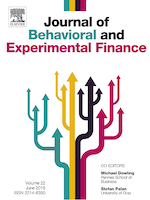
Journal of Behavioral and Experimental Finance
Scope & Guideline
Unlocking Behavioral Insights for Financial Innovation
Introduction
Aims and Scopes
- Behavioral Finance Research:
The journal emphasizes studies that investigate how cognitive biases, emotions, and social influences affect financial decision-making among individuals and institutions. - Experimental Economics:
It encourages the use of experimental methods to test hypotheses related to financial behavior, allowing researchers to observe real-time decision-making in controlled environments. - Impact of Socioeconomic Factors:
Research addressing how socioeconomic status, education, and cultural influences shape financial behaviors and investment decisions is a core area of focus. - Sustainability and ESG Factors:
The journal is committed to exploring the implications of environmental, social, and governance (ESG) criteria on investment decisions and corporate behaviors. - Technological Influence on Finance:
Research on how technology, including machine learning and digital platforms, shapes investor behavior and financial markets is increasingly prominent. - Risk Behavior and Financial Literacy:
Investigations into how financial literacy impacts risk perception and investment choices are central to the journal's scope.
Trending and Emerging
- Integration of Technology and Finance:
There is a significant rise in research exploring the role of technology, particularly machine learning and artificial intelligence, in predicting investor behavior and market phenomena. - Sustainable and Responsible Investing:
The focus on ESG (Environmental, Social, and Governance) factors and sustainable investing practices is increasingly prominent, reflecting a growing concern for ethical investment practices. - Behavioral Insights in Crisis Contexts:
Studies examining investor behavior during crises, such as the COVID-19 pandemic, are trending, providing insights into how stress and uncertainty affect financial decision-making. - Gamification and Financial Education:
Research on the application of gamification in financial education and its effects on improving financial literacy and decision-making is emerging as a key area. - Cultural and Social Influences on Finance:
There is an increasing interest in how cultural context and social factors influence financial behaviors, particularly in diverse and emerging markets. - Investor Sentiment and Market Dynamics:
The exploration of investor sentiment, especially in relation to social media and news, is gaining momentum, highlighting its impact on market movements.
Declining or Waning
- Traditional Financial Theories:
There is a noticeable decrease in studies solely focused on classical financial theories without integrating behavioral insights, suggesting a shift towards more interdisciplinary approaches. - Risk Management Models:
Research centered exclusively on quantitative risk management models without considering behavioral factors has become less frequent, indicating a move towards more holistic views of risk. - Static Analysis of Market Trends:
Papers that rely solely on static analyses of market trends and historical data without experimental or behavioral insights are being published less often. - Simple Correlational Studies:
The journal is moving away from basic correlational studies that do not explore underlying psychological mechanisms, favoring more comprehensive analyses. - Focus on Conventional Stock Markets:
Research specifically targeting conventional stock market dynamics without considering alternative investment venues (like cryptocurrencies) is becoming less common.
Similar Journals
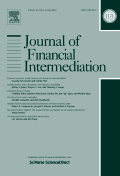
JOURNAL OF FINANCIAL INTERMEDIATION
Exploring the dynamics of finance and markets.JOURNAL OF FINANCIAL INTERMEDIATION, published by Academic Press Inc Elsevier Science, is a premier academic journal dedicated to the study of financial intermediation. First established in 1990, this esteemed journal has firmly positioned itself within the top quartile (Q1) of rankings in both Economics and Econometrics as well as Finance, reflecting its significant impact and relevance in the field. With an impressive Scopus ranking of #31 out of 317 in Finance and #74 out of 716 in Economics and Econometrics, it caters to a diverse audience, including researchers, professionals, and students interested in the intricate dynamics of financial markets and institutions. While the journal does not currently offer open access, it remains a vital resource for disseminating cutting-edge research and insights that drive innovation and inform policy-making in the financial sector. With a commitment to maintaining high academic standards, the JOURNAL OF FINANCIAL INTERMEDIATION continues to serve as an essential platform for advancing knowledge in financial theories and practices.
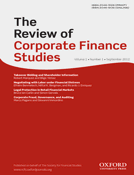
Review of Corporate Finance Studies
Leading the Discourse in Corporate Finance ExcellenceThe Review of Corporate Finance Studies, published by Oxford University Press, is a premier journal dedicated to advancing the understanding of corporate finance. With ISSN 2046-9128 and E-ISSN 2046-9136, this leading journal has established an esteemed position within the academic community, achieving a prestigious Q1 ranking in 2023 across multiple categories, including Business and International Management, Economics and Econometrics, and Finance. Its impact factor reflects its standing, placing it in the top echelons of finance literature, exemplified by a rank of #3/317 in Finance and #11/716 in Economics and Econometrics in Scopus rankings. The journal is committed to publishing high-quality, peer-reviewed research that fosters innovative insights and pragmatic solutions within the corporate finance domain. Dedicated to both theoretical advancement and practical application, the Review of Corporate Finance Studies is an essential resource for researchers, professionals, and students seeking to stay at the forefront of corporate finance scholarship.
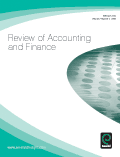
Review of Accounting and Finance
Illuminating Complexities in Accounting PracticesReview of Accounting and Finance, published by EMERALD GROUP PUBLISHING LTD, is a prestigious academic journal with a longstanding commitment to advancing scholarship in the fields of accounting, finance, and economics. With an ISSN of 1475-7702 and E-ISSN of 1758-7700, this journal has established itself as a key resource for researchers, professionals, and students seeking robust empirical and theoretical insights. It enjoys a strong reputation, reflected in its 2023 Scopus rankings, where it is positioned in the top quartile for Economics and Finance, and holds a Q2 category in Accounting. The journal covers a wide range of topics, aiming to foster discussion and disseminate knowledge that bridges the gap between theory and practice. Although it does not offer open access, its comprehensive scope is invaluable for those dedicated to understanding the complexities of financial systems and accounting practices from a global perspective. Published continuously from 2002 to 2024, the Review of Accounting and Finance is an essential outlet for innovative research that drives the discipline forward.
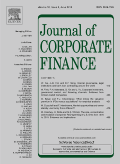
JOURNAL OF CORPORATE FINANCE
Pioneering Insights in the Corporate Finance LandscapeJOURNAL OF CORPORATE FINANCE, published by Elsevier, is a premier academic journal that represents the forefront of research in the fields of corporate finance, economics, and management strategies. With an impressive Q1 ranking across multiple categories and a 95th percentile standing in Scopus rankings, this journal is pivotal for advancing knowledge and fostering discourse among scholars, practitioners, and students globally. The Journal has been in continuous publication since 1994 and welcomes submissions that contribute to the understanding of corporate finance and related disciplines. Although it operates under a traditional access model, the Journal offers a rich repository of research outcomes pivotal for informed decision-making in corporate environments. Researchers and professionals looking to enhance their understanding of contemporary finance phenomena will find the JOURNAL OF CORPORATE FINANCE an invaluable resource.

International Review of Finance
Unveiling the complexities of finance and economics.International Review of Finance is a prestigious academic journal published by Wiley, located in the United Kingdom. With its ISSN 1369-412X and E-ISSN 1468-2443, this journal serves as an essential platform for researchers and practitioners in the fields of Economics and Finance. Ranked in the Q2 quartile for both Economics and Econometrics and Finance as of 2023, it showcases high-quality research that contributes significantly to theoretical and practical advancements. Reflecting its standing, the journal is positioned in the 61st percentile in Economics and Econometrics and the 60th percentile in Finance according to Scopus rankings. The scope of the journal includes a diverse range of topics, encouraging innovative discourse across various financial disciplines. Although it does not offer open access, the International Review of Finance continues to be an important resource for academics, professionals, and students seeking to deepen their understanding of evolving financial theories and practices.

JOURNAL OF FINANCIAL AND QUANTITATIVE ANALYSIS
Elevating Knowledge in Finance Through Empirical EvidenceJOURNAL OF FINANCIAL AND QUANTITATIVE ANALYSIS, published by Cambridge University Press, is a premier peer-reviewed journal that has been at the forefront of the finance and economics fields since its inception in 1966. With a notable impact factor reflecting its Q1 status in Accounting, Economics and Econometrics, and Finance for 2023, the journal is recognized for its substantial contributions to both theoretical and empirical research. Researchers and practitioners alike benefit from its comprehensive scope, addressing critical issues in financial analysis and quantitative methods. Although the journal does not currently offer open access, it remains widely accessible through institutional subscriptions. The editorial team is committed to fostering rigorous academic discussions that shape the future of finance and economics, making it an essential resource for academics, students, and industry professionals seeking to deepen their understanding of these vital disciplines. For more than five decades, this journal has continued to be an indispensable platform for disseminating influential research, thus solidifying its role as an essential cornerstone in the financial and quantitative analysis community.

Pacific-Basin Finance Journal
Navigating Economic Dynamics in the Pacific RegionPacific-Basin Finance Journal is a prestigious academic journal that focuses on critical developments and innovative research within the fields of finance and economics, specifically tailored to the Pacific region's unique economic landscape. Published by Elsevier, the journal boasts an impressive impact factor and is categorized in the Q1 quartile for both Economics and Econometrics and Finance as of 2023. This indicates its high relevance and position among the top journals in its field, with Scopus rankings reflecting a strong standing in the competitive landscape of finance research, holding the 45th position out of 317 in Finance and the 108th in Econometrics. Established in 1993, the journal is committed to disseminating rigorous theoretical and empirical research findings that enhance the understanding of financial systems in the Pacific Basin. Although the journal is not open access, it provides invaluable insights and comprehensive studies aimed at professionals, researchers, and students alike, fostering a deeper comprehension of the region's economic dynamics and global interconnectedness.

Annual Review of Financial Economics
Advancing the Frontiers of Financial KnowledgeAnnual Review of Financial Economics, published by Annual Reviews, stands as a pivotal journal in the fields of Economics and Finance, recognized for its rigorous analysis and comprehensive reviews since its inception in 2010. With an impressive impact factor reflected in its Q1 ranking in both Economics and Econometrics and Finance for 2023, this journal serves as an essential resource for researchers, professionals, and students keen on understanding the dynamic interplay of financial theories and practices. The ISSN 1941-1367 and E-ISSN 1941-1375 signal its commitment to accessibility and dissemination of cutting-edge research within the community. Addressing crucial topics from market behavior to economic modeling, each annual volume synthesizes the latest findings and theoretical advancements, thus contributing significantly to the global discourse within financial economics. With its high Scopus rankings, including a finance rank of #75 out of 317, the journal continues to foster a deep understanding of financial systems and their implications, serving as an invaluable tool for anyone engaged in the broader economic landscape.

European Journal of Finance
Elevating the discourse in finance and econometrics.European Journal of Finance is a prestigious publication specializing in the domains of finance, economics, and econometrics, published by Routledge Journals, Taylor & Francis Ltd. Established in 1995, this journal has become a vital resource for researchers, practitioners, and students, contributing significantly to the understanding of financial systems and markets. With its Q1 ranking in the Economics, Econometrics and Finance category, it stands out for its rigorous peer-reviewed articles that explore innovative theories, models, and empirical studies. The journal's impressive Scopus ranking of 35 out of 242 highlights its impact and relevance within the field, with an 85th percentile standing that underscores its importance to current financial research. Although it does not offer open access, the European Journal of Finance remains a cornerstone for those seeking to delve deeper into the complexities of finance, equipped with insights that drive both academic inquiry and practical application.
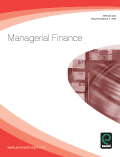
MANAGERIAL FINANCE
Unlocking Strategies for Contemporary Financial Challenges.MANAGERIAL FINANCE is a prestigious academic journal published by Emerald Group Publishing Ltd, focused on the areas of finance, management, and strategy. With an ISSN of 0307-4358 and an E-ISSN of 1758-7743, this journal has carved a niche for itself within the business and financial sectors, achieving a commendable Q2 category ranking across multiple domains, including Business, Management and Accounting, Finance, and Strategy and Management, as of 2023. The journal aims to provide a platform for insightful research and critical analysis while fostering an understanding of contemporary financial practices and theories. With its wide-ranging scope, it serves as a vital resource for researchers, professionals, and students alike, looking to stay abreast of the latest trends and challenges in managerial finance. The editorial board is committed to maintaining academic rigor, ensuring that articles published are of the highest quality and relevance to the field. By bridging the gap between theory and practice, MANAGERIAL FINANCE is an essential reference for anyone involved in financial decision-making and strategic management.